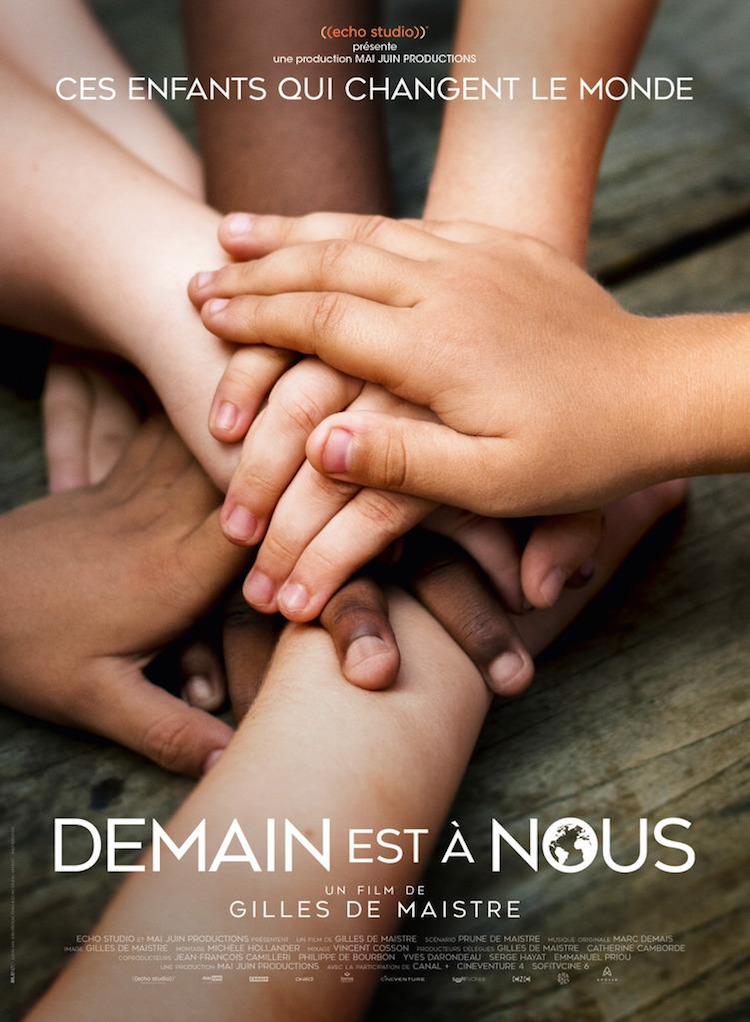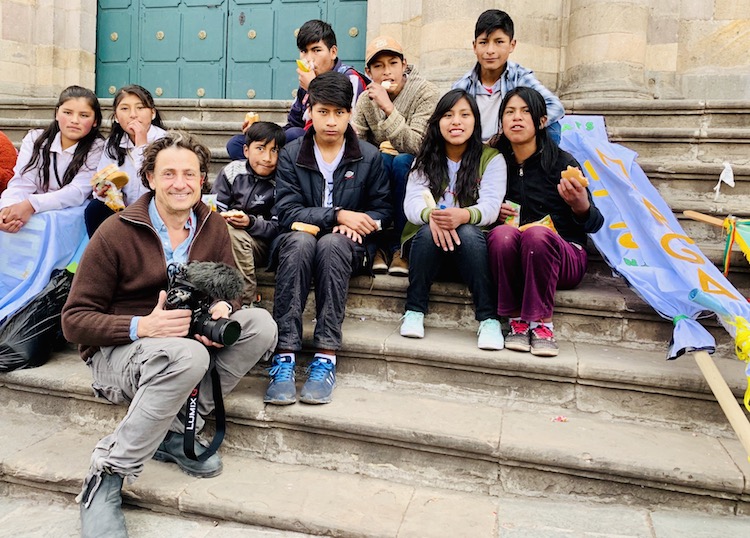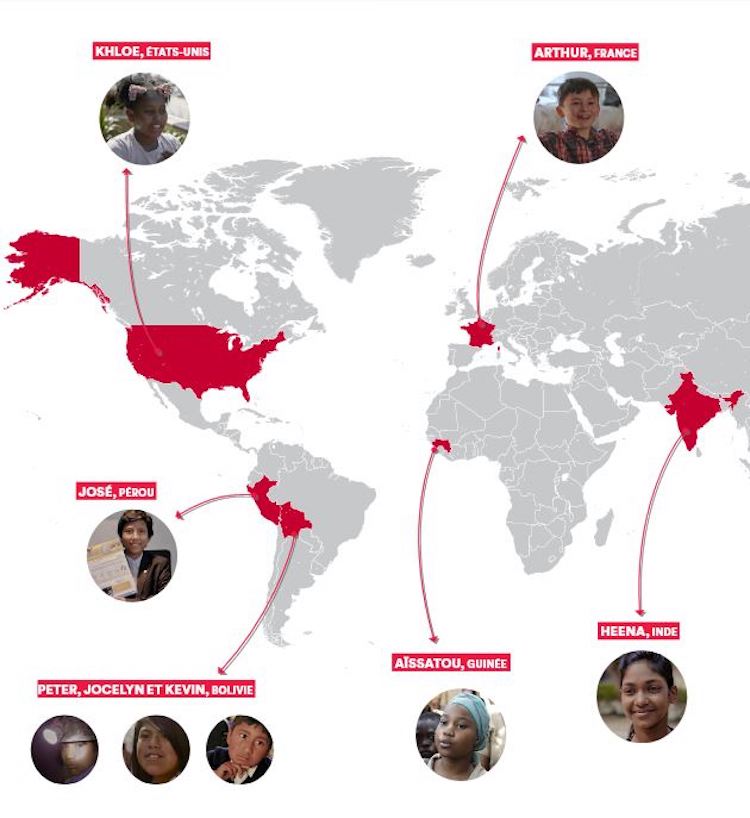A candidate for the prestigious César award, French filmmaker Gilles de Maistre’s latest documentary “Demain est à Nous” follows teen pioneers who rapidly change society
Suppose you were invited to a party along with José Adolfo the Peruvian environmental-minded banker, Arthur the French community organizer for the homeless, Aïssatou the Guinean gender equality advocate, Heena the Indian reporter and teacher, and Peter, Kevin and Jocelyn, three Bolivian child rights campaigners. All of them enjoy international recognition. All of them have created amazing social change in the lives of others and in their communities. Some have won prestigious awards. Surely you would look forward to picking their brains, maybe fish for sympathy about the lamentable state of world affairs, or simply listen to their educated discourse. But what if you arrived and realized that these highly successful movers and shakers were all only between 10 and 15 years old?
 Award-winning French director Gilles de Maistre has tracked the work of these (pre)pubescent activists and interwoven their inspiring stories and accomplishments in a feature-length documentary that spans the globe. Released in French theatres in September 2019, “Demain est à Nous” (or “Forward” in its English version) has already earned a first “Best Documentary” award at the Colcoa Film Festival and is a candidate in the same category for the 2020 César, the French film industry’s equivalent of the Oscars, the award ceremony being held on 28th February 2020 in Paris. And rightfully so, because this is a beautifully told and sensitively shot story of hope, of an iron-clad can-and-will-do attitude, and most of all, of tremendous and rapidly spreading social impact on a global scale.
Award-winning French director Gilles de Maistre has tracked the work of these (pre)pubescent activists and interwoven their inspiring stories and accomplishments in a feature-length documentary that spans the globe. Released in French theatres in September 2019, “Demain est à Nous” (or “Forward” in its English version) has already earned a first “Best Documentary” award at the Colcoa Film Festival and is a candidate in the same category for the 2020 César, the French film industry’s equivalent of the Oscars, the award ceremony being held on 28th February 2020 in Paris. And rightfully so, because this is a beautifully told and sensitively shot story of hope, of an iron-clad can-and-will-do attitude, and most of all, of tremendous and rapidly spreading social impact on a global scale.
Kids usually do not concern themselves with the limits adults see, or with what the media say about the gloom and doom all around us. Rather, they explore ideas and concepts outside the box, and start implementing them in their immediate surroundings, one small step at a time. The helping hand of a supportive parent, teacher or community is welcome but these young activists are not afraid of making their voices heard and to work hard to create change. Real, meaningful, life-altering change. That is the base note of this feature-length documentary.
From India to Peru, from Bolivia to Guinea, via France and the United States, de Maistre’s unobtrusive camera follows several young protagonists who fight for what they believe in – a better future for themselves and their communities. Exploitation of human beings, child labour, forced marriages, environmental destruction, extreme poverty… no social justice topic is off limits. Many of these young pioneers became aware early on of inequality and dysfunction, either because they themselves live in squalid conditions, or because they witness them in daily life, and they decided to do something about it. They reach out, they mobilize their peers, they do what it takes to get adult leaders to listen, and they make things happen.

JOSÉ ADOLFO – AGE 15 – AREQUIPA, PERU
Environmental Protection and Banking
At the age of 7, José Adolfo Quisocala Condori from Peru founded a bank cooperative that does more than build saving accounts for kids, it also creates awareness for the importance of protecting the environment through the collection of waste and recycling. To open and maintain an account, a child has to bring at least 5 kg of recyclable waste (plastic or papers), and at least 1 kg per month thereafter. These recyclables are sold to specialized companies. In exchange, the young customers receive a specific currency they can use to buy products offered by the bank or they may exchange it for real money. Today, 3,000 youths between the ages of 10 and 18 are invested in José Adolfo’s program.
ARTHUR – AGE 10 – CAMBRAI, FRANCE
Solidarity and Community Management
In the Northern French town of Cambrai, 10 year old Arthur Soufflet brings food, clothing, and a kind word to the homeless. The boy started the project when he was 5 years old, encouraged by his parents who noticed his desire to help the most vulnerable and destitute. They suggested to start with something that he enjoyed doing as a way of raising money, and he chose painting and drawing. So far, he has sold over 100 paintings, each yielding between 50 and 200 euros. With this money Arthur goes shopping and then, with Mom’s help, distributes the items to people living in the street. His dream is to raise enough money to buy a house for the homeless. His example has inspired many followers in his hometown who now do their part to help those without a roof over their head.
AISSATOU – AGE 13 – GUINEA-CONAKRY
Gender Equality Advocacy
Idrissa Bah has fought against forced teen marriage since she was 13 years old. Today, at 19, she is the president of the girls’ leadership club of Guinea. At the age of 12, Aissatou Barry stepped in Idrissa’s shoes, poised to take over the fight against violence against women, and particularly against forced marriage of underage girls. This issue is problematic for many reasons, including mental and psychological trauma, physical abuse, difficult pregnancies and births, and the definitive end of education for the girl in question. While not legal, early marriage is still commonly practiced in many African countries. Aissatou therefore organizes awareness campaigns in schools and across town, and meets tirelessly with institutions and political personalities. She also intervenes – and at the eleventh hour if needed – to save teenage brides from being married.

HEENA – AGE 11 – NEW DELHI, INDIA
Education and Empowerment through Reporting and Teaching
In New Delhi, a monthly newspaper called Balaknama (“The Children’s Voice”) is written by and for children living and working on the street. The young writers are involved in all stages of its creation, from articles about the many problems they encounter to a list of the projects in which they participate in their quest for a better life. Heena, 11, is one of these child reporters. She and her “colleagues” put much careful thought into their stories, making each of them a piece of real editorial work. She, her peers, and many adult volunteers distribute the newspaper, and organize lessons for young illiterate people, taught by Heena.
KEVIN, JOCELYNE AND PETER – AGES 10, 12, AND 13 – POTOSI, BOLIVIA
Civil Rights Champions
In Bolivia, a country of eleven million people many of which live in extreme poverty, child labour provided by one million children is culturally considered “normal” and is in fact an important source of income for their families. Child labourers working in mines and brickyards have therefore created a union – not to protest against having to work but to protect themselves from abusive employers. They would of course prefer that child labour were abolished altogether. But for as long as the economic necessity for it exists, the union helps to secure their right to work without a legal age limit and to improved work conditions and wages, but it also defends the youths’ right to education. Among the teenage leaders on the forefront of this movement, are Kevin, Jocelyn and Peter. Between working, protesting, and studying, their days are long but they are role models to their peers and have created a veritable ripple effect.
These junior social warriors from every nook and cranny of the globe are also interested what their peers do, whether that’s 11 year old Hunter Mitchell from South Africa who is fiercely determined to save the rhino population and has made astonishing inroads already… or Khloe Thompson who at the ripe old age of 8 started a non-profit named Khloe Kares and has in the three years of its existence distributed over 5,000 canvas goodie bags among the homeless and poor in her home town of Los Angeles. There are many, many more examples… And suddenly, teen activists are popping up all over the globe. What they have understood is that “changing something” equals “doing something”, and that sharing and caring is the only successful way forward. This crucial insight is taking the world by storm… to the wide-eyed astonishment and not always undiluted pleasure of the adult establishment.
“It’s a whole new movement of kids empowering other people, and other kids as well,” Khloe says poignantly. And regardless of where they come from or what cause they have taken on, the shared credo is that if everyone does what he or she can, we will jointly be able to fix the world’s social and environmental problems.

Gilles de Maistre is a well-known and respected veteran director who has been picking up social issues on a regular basis, coupling them with unique lifestories. In 2018, he became a household name the world over with his feature film “Mia et le Lion Blanc”, the highest-grossing French production outside France in 2019.
In this new documentary, he walks in the footsteps of these young groundbreakers whose vocation is often rooted in their own experience of growing up poor and disenfranchised. Demain est à Nous is almost reminiscent of a road movie, narrated by one of the protagonists, José Adolfo. The viewer becomes a discreet fly on the wall as the young Peruvian works in his town, rises to a certain prominence, gives speeches and media interviews, and tells the stories of the other boys and girls featured in this film. And sometimes we get a glimpse that the determined adolescent with great leadership qualities is not a superhuman but still a kid somewhere that likes to play and gets tired like any other.
When Jose Adolfo goes to Sweden to pick up the prestigious ‘Children’s Climate Prize’ he was awarded, he meets his international fellow nominees, all around the same age, who like him developed formidable projects with a positive and far-reaching impact on the environment. In fact, Greta Thunberg was one of the other four finalists but she renounced out of protest that the others arrived in Stockholm by plane.
These kids are not the first ones ever to speak out against the misdeeds of greedy capitalists out to destroy the planet. Unforgotten the flaming appeal by then 12 year old Canadian Severn Cullis Suzuki at the 1992 Rio Earth Summit which garnered worldwide attention, and of course more recently the likes of Malala Yousafzai or Greta Thunberg.
But there is a different quality to this particular crop of youths born in the early years of the 21st century. They don’t wait for politicians to do something. Instead of giving inflamed speeches or doing PR-focused media campaigns, this lot starts and runs nonprofits to maximize their immediate social impact as a platform for global change. “They never think they are too young, too weak, too isolated to be rise up against injustice or violence. On the contrary, thanks to their strength character and courage, they turn the tide, empowering dozens of other children,” Gilles de Maistre says.
And the more other kids see what such determination can do, the more they are motivated to do their share. “Generation Doer” is born, it is currently in its pre- or early teens, it is keenly aware of the social imbalance, it understands that each of us holds the key for a brighter, fairer future for all… and, suddenly, with the prospect of these young people being tomorrow’s business and political leaders, there is justified hope that the world will indeed change for the better. Because “Demain est à Nous” – Tomorrow belongs to Us.
— Gilles de Maistre
After its September 2019 premiere in France and Belgium, Demain est à Nous opened in Francophone Switzerland in November and is scheduled for release in Germany in May 2020. Currently there are two festival selections Future releases in other markets to be announced. The DVD will be available on January 27, 2020. A pedagogic handbook (in French) is also available.
![]()
All images courtesy Demain est à Nous; photo of Gilles de Maistre by Gillesdemaistre – Own work, CC BY-SA 4.0, Link


Leave a Reply